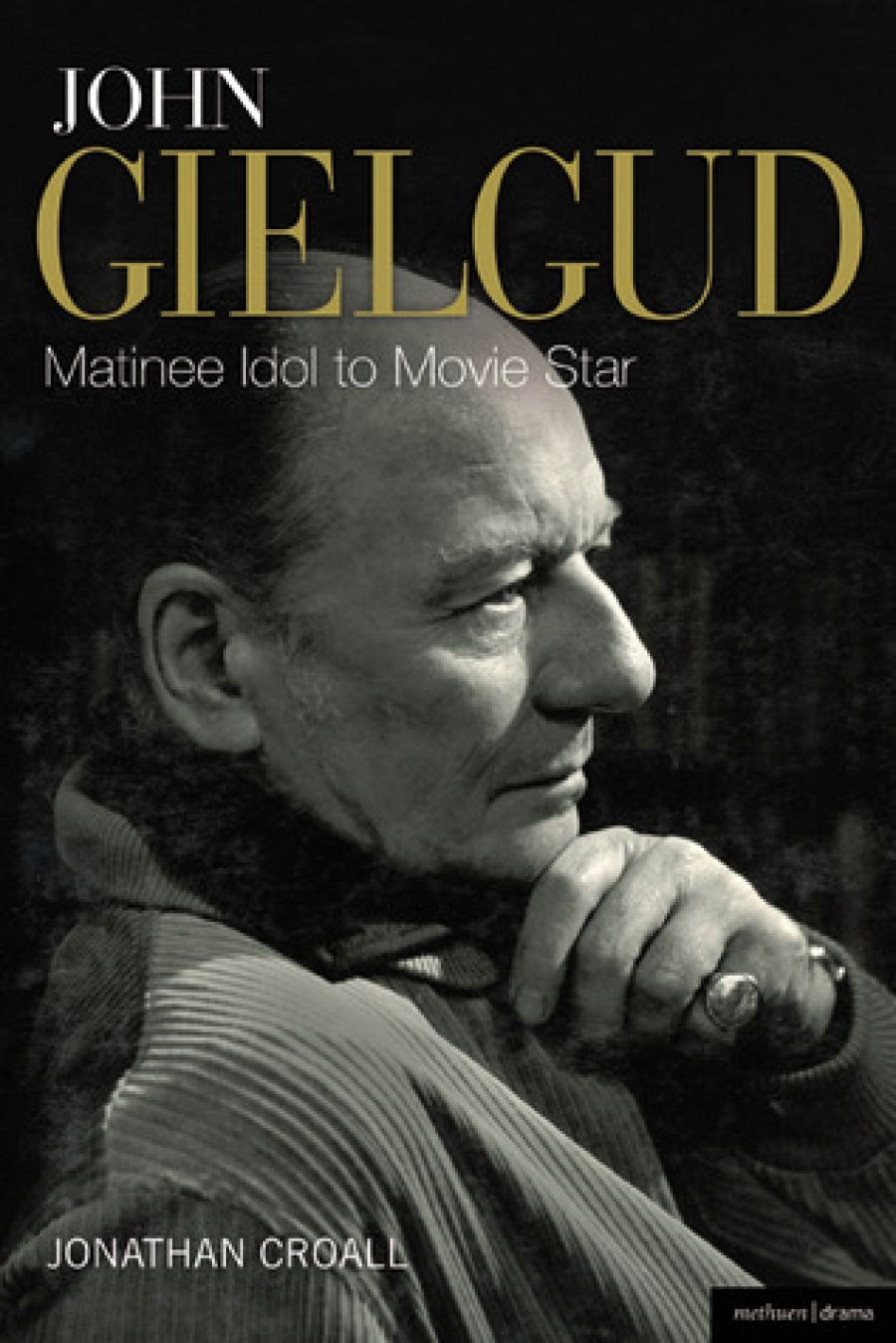
- Free Article: No
- Contents Category: Biography
- Review Article: Yes
- Online Only: No
- Custom Highlight Text:
As the dust settles on twentieth-century acting giants, and reputations are appraised, it is at least arguable that John Gielgud emerges as the greatest. Certainly his was the longest and most varied career, spanning nearly eighty years, only death itself, when he was ninety-six, causing him to slow down. Since then his pre-eminence has seemed confirmed as one reads about him and his distinguished contemporaries.
- Book 1 Title: John Gielgud
- Book 1 Subtitle: Matinee Idol to Movie Star
- Book 1 Biblio: Methuen Drama, $75 hb, 688 pp
These latter – Olivier, Richardson, Guinness, Redgrave – have all given rise to biographies, but none has been as fortunately served as Gielgud. Jonathan Croall’s first go at his life (Gielgud: A Theatrical Life) appeared in 2001, when it immediately set a new benchmark in the show business biography genre, especially as compared with Sheridan Morley’s slipshod, dirt-dishing account of Gielgud in the same year. Now, having had access to many previously unpublished letters and other papers, plus a great deal more attention to the late-flowering film career, Croall has, in this second edition, made any further attempt on the actor’s life redundant.
Usually acknowledged as the most eloquent speaker of Shakespearean verse, and described by his non-fan, the waspish Kenneth Tynan, as the best actor in the world from the neck up, his Hamlet, Prospero, and many other key roles set exacting standards for his successors to aim at. His Macbeth was less certain and his Othello a disaster, pointing perhaps to a lack of fierce physicality – or maybe the result of his having, as critic Ivor Brown noted, ‘the most meaningless legs imaginable’. But his range was nevertheless vast, as was his influence, and Croall meticulously traces the ways in which he takes on and modernises the late Victorian idea of the actor–manager, reinvigorates the classical repertoire in London’s West End, later adjusts to the more iconoclastic demands of the Royal Court theatre, eventually joins the National Theatre (where Olivier’s jealousy may have delayed his participation), and becomes a familiar presence on film and television from his fifties until his death.
He hurdled the decades and changing theatrical fashions with apparent ease. Croall has the knack of vividly evoking stage performances from the past and gives a sense of how Gielgud went about approaching these – and his screen roles. He also makes engrossing reading of how they were received, without descending into tiresome lists of snippets from reviews, which often make such books wearisome. Instead, he creates a series of mini-dramas in chronicling the way the actor’s work was received.
Gielgud was wary of film for a long time. Like many stage-trained actors in the early days of film, he regarded the new medium as a source of financial rather than artistic rewards, and in the 1940s his movie career seemed totally stalled. He was never going to be a conventional screen leading man, but in the latter half of his life he became a character actor par excellence. Playing Cassius in MGM’s excellent version of Julius Caesar in 1952 was probably the turning point, and Gielgud went on delivering the goods for nearly another fifty years. He claimed to have observed James Mason closely as he played Brutus, and he won the admiration of Marlon Brando, who was Antony in this eclectically but excitingly cast Shakespeare film. There were to be many film highlights in the ensuing decades, whether hinting discreetly at father Barrett’s possibly incestuous leanings in The Barretts of Wimpole Street (1957) or moving wearily towards death as the king in Orson Welles’s sublime Chimes at Midnight (1965). He also starred magisterially in Alain Resnais’s Providence (1977) (maintaining his dignity even from a toilet seat in one sequence) and Peter Greenaway’s imaginatively daring Prospero’s Books (1991), daring for Gielgud, as he spoke all the dialogue and, at eighty-seven, appeared naked at one point. The list is almost unending, with television triumphs, too, most memorably as Charles Ryder’s bleak father in the much-revered Brideshead Revisited miniseries (1981).
I stress the film and television appearances because they constitute one of the highlights of Croall’s new edition, in which they are now treated much more fully. He has spoken to many of those associated with Gielgud in these films, for screens large and small, as well as having viewed almost all of them, so that he is able to give vivid images of the actor’s work and style.
But the career is not all. Gielgud emerges from all the research – from written or oral sources or actual viewings of the work – as a whole man, one perhaps only fully alive when working. He came from the theatre aristocracy of the Terry family on his mother’s side, but he never learned how to behave in the grand manner. Consequently, he seems to have been much loved and esteemed by those who worked with him, with the possible exception of Olivier, who always appeared warily in competition with him.
The cottaging scandal of 1953 is treated as an important and painful episode in the actor’s life, but there is nothing prurient in Croall’s dealing with it. Ardently homosexual, Gielgud had several long (but non-exclusive) relationships, and these wind their way through the crowded narrative of a life full of achievement. Maybe the scandal cost him a peerage, but he was rewarded by having bestowed on him the rare Companion of Honour in 1977.
Gielgud had plenty of faults and was famously given to verbal gaffes, but was curiously devoid of malice. From Croall’s 700-page account emerges a staggeringly prolific and very engaging figure – both career and man brought to brilliant life. With this and his biography of Sybil Thorndike, Croall stakes a serious claim to be the most notable theatrical biographer of the day.


Comments powered by CComment